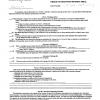Published originally on April 25, 2015 - Chaos Theory and Pharmacology - URL: http://wp.me/p4UVo9-1mq
Dear Professors of Psychiatry (*)
Universidad del Valle, Cali, Colombia
Ref: First Open Letter: Department of Psychiatry, Medical School, Universidad del Valle, Cali, Colombia - URL: http://wp.me/p4UVo9-18k
1. The lack of answer, it is also an answer by itself.
Acquiescence.
“to accept, agree, or allow something to happen by staying silent or by not arguing”
Origin of ACQUIESCE
“French acquiescer, from Latin acquiescere, from ad- + quiescere to be quiet — more at quiescent
First Known Use: 1651″
Related to ACQUIESCE
“Synonyms
accede, agree, assent, come round, consent, subscribe
Antonyms
dissent“
Definition by Merriam-Webster: An Encyclopædia Britannica Company
“A silent or passive assent or submission, or a submission with apparent content; – distinguished from avowed consent on the one hand, and on the other, from opposition or open discontent; quiet satisfaction.”
“legal
Submission to an injury by the party injured, or tacit concurrence in the action of another.”
Definition by Grammarly
2. Trust.
“Trust is confidence in the honesty or integrity of someone or something. It involves a complex mixture of cognitive and emotional beliefs and expectations that create an attitude of optimism about the motives and competence of the person being trusted.
Trust requires the calculation that someone has the knowledge and expertise to do what they are being trusted to do, but it also necessitates believing that whatever they are being trusted to do is done in good faith with honesty, sincerity, and integrity.
Trust presupposes adherence to moral principles, codes of conduct, and ethical standards and requires an implicit conviction that the other person aspires to help and not to harm.
Political abuse of psychiatry is the “misuse of psychiatric diagnosis, detention and treatment for the purposes of obstructing the fundamental human rights of certain groups and individuals in a society.”
It is more often seen under totalitarian rule (the Soviet Union, China) where dissent was disapproved, often punished, and those perceived as threats to the existing political system could be effectively “neutralized with trumped up psychiatric illness. By this stigmatization reputations were ruined, power was diminished, and voices were hushed.
It involves the deliberate action of diagnosing someone with a mental condition that they do not have for political purposes as a means of repression or control.
It is important to recognize that the unique role of discrediting opinion and dehumanizing those with one whom disagrees is not limited to totalitarian regimes. The coercive use of psychiatry represents a violation of basic human rights in all cultures.” — Dr. Michael L. Langan.
http://disruptedphysician.com/2015/02/09/whistleblowers-and-psychiatrists/
3. There is no need to be over polite.
There have been other cases of abuse of psychiatry at the University, non-political characteristics, but the systematic violation of one or more of the principles of medical ethics. I am also aware of several cases of undergraduate students that received forced psychiatric treatment, involuntary placement and irrational prescriptions of psychiatric drugs. Many of these students are hesitant to speak up because their minds were labelled with insanity and irrationality, they often received a psychiatric diagnosis without sufficient evidence of an underlying mental disease.
It is a system of coercion, whether ‘subtle’ (e.g., referral to a psychiatrist’s) or forced psychiatric treatment (i.e., involuntary placement and administration of medicines without patient consent). This is only possible through the systematic violation of patient autonomy, which goes along with breaking the principles of medical ethics, overdiagnosis of mental disease and overtreatment with a profitable business of a growing list of psychiatric drugs with unknown safety and effectiveness. Widespread bribery and corruption, involving undisclosed liaisons between doctors and the drug industry, human rights are violated every day by forced psychiatric treatment and no one seems to note it, only after receiving ill-treatment by these coercive methods of dictatorial “medicine”.
Read more:
– There is no need to be overpolite
http://chaoticpharmacology.com/2015/04/23/there-is-no-need-to-be-over-po...
– Open Letter to the Rector of the University of Valle (Cali, Colombia) and the Dean of the Health Faculty
http://chaoticpharmacology.com/2015/04/21/segunda-carta-abierta-univalle...
4. Legal authority
…”At bottom, the human rights problem raised by these prosecutions is the criminalization of dissent; repression of dissent is problematic whether the dissenter is sent to jail or to a psychiatric hospital. However, it would be a mistake to regard the hospitalization of dissidents as only a derivative problem. To hospitalize a dissenter who is not mentally ill on grounds of non-imputability combines repression with moral fraud and magnifies the violation of human rights; it demeans the dissenter’s dignity, devalues his or her message and establishes the legal authority for an indeterminate period of what can only be called psychiatric punishment.”…
Perlin, Michael L., International Human Rights and Comparative Mental Health Law: The Role of Institutional Psychiatry and the Suppression of Political Dissent. Israel Law Review, Vol. 39, pp. 71-97, 2006; New York Law School Legal Studies Research Paper No. 06/07-26. Available at SSRN: http://ssrn.com/abstract=982217
—
(*) http://salud.univalle.edu.co/medicina/psiquiatria/index.php?m=quienes_so...
Andrea Otero Ospina
Carlos A. Miranda
Bastidas Eduardo Castrillon
Gerardo Campo Cabal
Gloria Elena Macias
Henry Valencia
Juan Carlos Rivas
Maria Adelaida Arboleda
Maria Constanza Motoa
Martha L. Velasquez
Omar Fernando Salazar
Patricia Quevedo De Bendek
—
P.D.
Saludos a los profesores de psiquiatría de la Universidad del Valle, de paso también saludos a los profesores de psiquiatría de la Fundación Valle del Lili y la Universidad Icesi, así como a la Asociación Colombiana de Psiquiatría.
“Hasta entonces, chao, y gracias por toda la serotonina.”(1-3) — Dr. David Healy.
1. Healy David. Serotonin and depression BMJ 2015; 350:h1771
http://www.bmj.com/content/350/bmj.h1771
2. Medicina basada en mitos (traducción del artículo por Marc Casañas Escarré).
http://www.nogracias.eu/2015/04/25/medicina-basada-en-mitos/
3. So Long and Thanks for all the Serotonin
http://davidhealy.org/so-long-and-thanks-for-all-the-serotonin/















